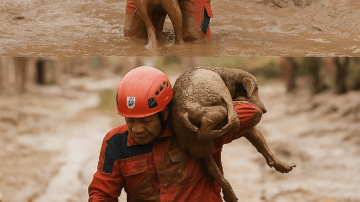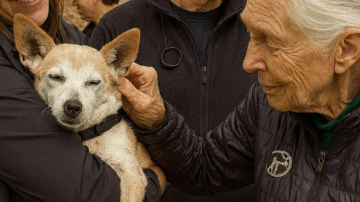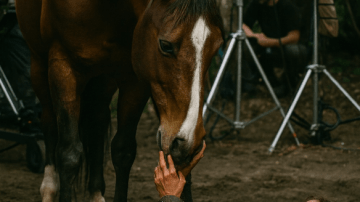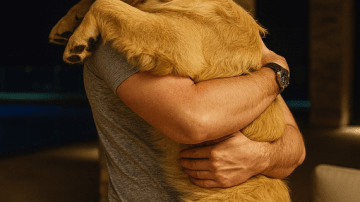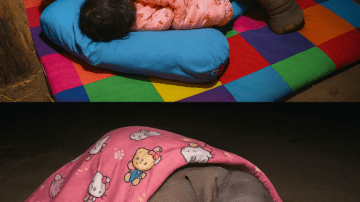The first call came from a neighbor. Her voice shook as she begged us to save them. A mother dog and her puppy were being held by their owner, starved, weak, and without the strength to even stand.

I had never seen such a fragile puppy before. His body was tiny, filthy, and every rib stood out against his thin skin. Both mother and child were so malnourished that they swayed when they tried to walk. Hunger had stolen nearly all of their strength.
We rushed them to the veterinarian. The test results were devastating. Severe malnutrition. Dehydration. Anemia. Their blood counts were dangerously abnormal. Fleas and ticks crawled all over them. Their white blood cell count was high—sign of infection. Even their blood was poisoned. It was a miracle they had survived this long.
The mother dog had given everything she had to her puppies. But without food, her milk dried up. We kept the puppy beside her as much as possible, but she cried constantly, distressed at her inability to feed him. The veterinarian said both were fighting for their lives, hanging by the thinnest thread.
Treatment began immediately. They received red blood cell–stimulating injections. We carefully divided food into many small meals, feeding them slowly so their fragile stomachs could handle it. The puppy clung desperately to his mother, missing her when separated for treatment. Each time they were reunited, my heart ached. The mother was so gentle—licking, kissing, and cuddling him as if apologizing for not being able to give him more. And every time, the puppy cried when we pulled them apart again. He looked at me with wide, innocent eyes, begging silently to be allowed back in her arms.

Ten days later, things improved. Their blood tests looked better. Red blood cell counts rose from 18.8% to 23.1%. For the first time, there was hope. After two weeks, the doctors allowed them to go home together. Their reunion was pure joy. Life suddenly looked bright, like turning the page to a completely different chapter.
The puppy had never known comfort before. Now, he rolled and wriggled on a soft bed, as if the feeling of warmth and padding beneath him was a miracle in itself. Both mother and pup ate well every day. To them, the sensation of being full had once been only a distant dream. Now, it was reality.
I often lay beside the little one on that bed. He was clever, sweet, and quickly grew closer to me. He followed his mother everywhere, never letting her out of sight. Watching them together filled me with happiness.
But calm skies often hide approaching storms. I noticed the puppy stumbling when he walked. He no longer ate with the same appetite. Sometimes, he even vomited. My heart sank. We rushed him back to the vet. Tests revealed what we feared: enteritis. A dangerous, often deadly intestinal infection in puppies.

The doctor prescribed medicine, and we watched him around the clock. His mother sensed our worry. She stayed close, anxious, licking him as if trying to chase away the sickness.
Meanwhile, the mother’s health improved. She gained weight steadily, her ribs disappearing under new layers of flesh. Her mood lightened. She even began to make friends with other dogs for the first time in her life. But her son’s struggle cast a shadow over every smile.
The truth of their past came out. The authorities questioned the owner, who admitted his neglect. He claimed he had simply been too busy with his small grocery shop in the city. He often didn’t return home for three or four days. The dogs were fed only once or twice a week. The mother had given birth to five puppies. Four had already died from starvation. Only this one remained.
The nightmare they had endured broke me. No wonder they were always so hungry. No wonder the mother cried every night. She had tried everything to keep her baby alive.

But enteritis is merciless. A month after rescue, the puppy grew weaker. He ate little, refused to run, and weighed barely a kilogram. The veterinarians worked tirelessly, giving him IV fluids day and night. We prayed for a miracle.
It never came.
The mother asked me, in her own way, about her child. She stared, searching for answers I couldn’t give. When silence was my only reply, she whimpered, then cried. For days afterward, her grief filled the room. She had lost her most precious treasure.
Those were the hardest days. She lingered near the bed where her puppy once slept, curling into the faint warmth he had left behind. It took time—days of quiet mourning—before her sadness eased. Slowly, she began to move forward, though the memory of her lost child remained carved into her heart.
Friendship helped her heal. Other dogs in the house stayed close to her side, comforting her. Gradually, her spirit lifted. She found joy in playing again, even laughter in small things. Yet she never climbed back onto that bed. It remained sacred—a memorial to her puppy.
Do dogs feel as deeply as we do? Without question, yes. I believe it with all my heart.
Her name is Khannon.
Today, she is beautiful. Strong. Loved. When I come home, she is the first to greet me, tail wagging, ears pricked. She hears my car from far down the road and races to the door, eager as ever. She has blossomed, but her story will always remain sad.
I promise to love her always, to make up for the years of neglect, to give her the best life possible. She deserves nothing less. Now, she has me. She has friends. She has people who truly love her and will protect her forever.
And with that, Khannon’s story continues—not as a tale of chains and hunger, but as a story of survival, healing, and love.

